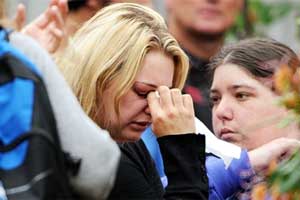A second explosion at the Pike River mine this afternoon ended all hope of the 29 missing miners being rescued.
 A small West Coast community will now face the task of recovering and rebuilding following a disaster of devastating proportions. The Science Media Centre asked trauma and disaster recovery experts to comment on the challenges the families of the Pike River mine victims and the wider commuity will face both in the days ahead and in the long term.
A small West Coast community will now face the task of recovering and rebuilding following a disaster of devastating proportions. The Science Media Centre asked trauma and disaster recovery experts to comment on the challenges the families of the Pike River mine victims and the wider commuity will face both in the days ahead and in the long term.
Professor Beverley Raphael, from the University of Western Sydney School of Medicine, heads a specialist research unit which tackles the mental health issues associated with disasters, terrorism and other adversity.
She is an internationally-recognised leader in the field, having led the mental health response to mass disasters like the Granville Rail Disaster, the Newcastle earthquake, and more recently, the Bali bombings, South East Asian Tsunami and the Victorian bushfires.
The nature of the tragedy:
“This is a particularly terrible grief because of the prolonged uncertainty, the complexity of the effort to get them out and the inability to be able to do so. Compounding it has been the anger and helplessness that everyone has felt including the rescuers.
“The explosion, the toxic nature of the gases, particularly the prolonged period, will influence how family members imagine the way their loved ones have died.”
The Chile miracle effect:
“The almost magical rescue of people in other countries doesn’t help. In New Zealand many of the family members will be asking themselves ‘why couldn’t that happen here? Why couldn’t my loved one have been saved?'”
Trauma and small communities:
“The fact it is a small community will compound the problem. In a small community, the whole community is affected. These people are intimately connected, many of them have been there their whole lives and grown up with each other.
“They may be wanting to keep themselves from outsiders and not have intrusion from people who mean well.
“This disaster is on the front pages of newspapers for the first week or so but later on the coverage dies away and people may feel abandoned. It is really important that people keep in touch with this community. The real grief and pain will actually come over time.”
Self-help the best way to recovery:
“In the early period they must stay united and the shared grief will bring them together
“They need to be supported by others being available for what they say they need. Its no good pushing counseling or anything similar onto them.
“They might need support people to help them with practical things. What was recommended after the London bombings was a family liaison officer who would cut through the bureaucracy on issues and touch base with the family regularly.
“The support needs to be there for them, but it shouldn’t be forced on them.”
Dealing with survivor guilt:
“There will be a lot of people dealing with survivor guilt and conversely a lot of anger as well from people. They will be thinking: “why my loved one? Why wasn’t it someone else?
Financial and vocational support:
“These are proud and independent people but they are likely to need some outside financial assistance.
“The mine workers may not want to work in the mine again. They may need to retrain and that needs to be taken into account in their support.”
Black Saturday fires:
“The [families of victims who died in the Black Saturday fires] were resilient in lots of ways, particularly the people who quickly formed self-help networks.”
Further comments will be added to the Science Media Centre website.